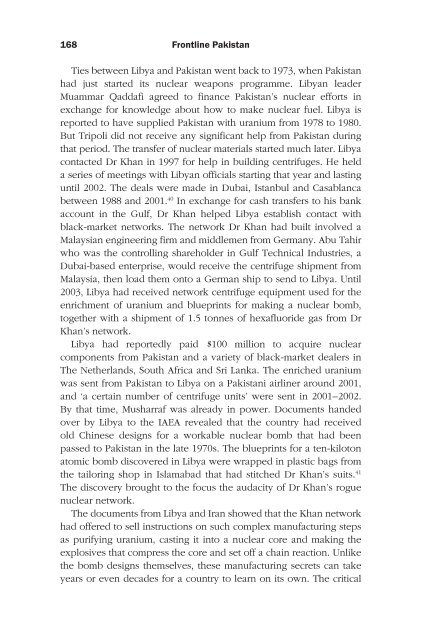Frontline Pakistan : The Struggle With Militant Islam - Arz-e-Pak
Frontline Pakistan : The Struggle With Militant Islam - Arz-e-Pak
Frontline Pakistan : The Struggle With Militant Islam - Arz-e-Pak
Create successful ePaper yourself
Turn your PDF publications into a flip-book with our unique Google optimized e-Paper software.
1 <strong>Frontline</strong> <strong><strong>Pak</strong>istan</strong><br />
Ties between Libya and <strong><strong>Pak</strong>istan</strong> went back to 1973, when <strong><strong>Pak</strong>istan</strong><br />
had just started its nuclear weapons programme. Libyan leader<br />
Muammar Qaddafi agreed to finance <strong><strong>Pak</strong>istan</strong>’s nuclear efforts in<br />
exchange for knowledge about how to make nuclear fuel. Libya is<br />
reported to have supplied <strong><strong>Pak</strong>istan</strong> with uranium from 1978 to 1980.<br />
But Tripoli did not receive any significant help from <strong><strong>Pak</strong>istan</strong> during<br />
that period. <strong>The</strong> transfer of nuclear materials started much later. Libya<br />
contacted Dr Khan in 1997 for help in building centrifuges. He held<br />
a series of meetings with Libyan officials starting that year and lasting<br />
until 2002. <strong>The</strong> deals were made in Dubai, Istanbul and Casablanca<br />
between 1988 and 2001. 40 In exchange for cash transfers to his bank<br />
account in the Gulf, Dr Khan helped Libya establish contact with<br />
black-market networks. <strong>The</strong> network Dr Khan had built involved a<br />
Malaysian engineering firm and middlemen from Germany. Abu Tahir<br />
who was the controlling shareholder in Gulf Technical Industries, a<br />
Dubai-based enterprise, would receive the centrifuge shipment from<br />
Malaysia, then load them onto a German ship to send to Libya. Until<br />
2003, Libya had received network centrifuge equipment used for the<br />
enrichment of uranium and blueprints for making a nuclear bomb,<br />
together with a shipment of 1.5 tonnes of hexafluoride gas from Dr<br />
Khan’s network.<br />
Libya had reportedly paid $100 million to acquire nuclear<br />
components from <strong><strong>Pak</strong>istan</strong> and a variety of black-market dealers in<br />
<strong>The</strong> Netherlands, South Africa and Sri Lanka. <strong>The</strong> enriched uranium<br />
was sent from <strong><strong>Pak</strong>istan</strong> to Libya on a <strong><strong>Pak</strong>istan</strong>i airliner around 2001,<br />
and ‘a certain number of centrifuge units’ were sent in 2001–2002.<br />
By that time, Musharraf was already in power. Documents handed<br />
over by Libya to the IAEA revealed that the country had received<br />
old Chinese designs for a workable nuclear bomb that had been<br />
passed to <strong><strong>Pak</strong>istan</strong> in the late 1970s. <strong>The</strong> blueprints for a ten-kiloton<br />
atomic bomb discovered in Libya were wrapped in plastic bags from<br />
the tailoring shop in <strong>Islam</strong>abad that had stitched Dr Khan’s suits. 41<br />
<strong>The</strong> discovery brought to the focus the audacity of Dr Khan’s rogue<br />
nuclear network.<br />
<strong>The</strong> documents from Libya and Iran showed that the Khan network<br />
had offered to sell instructions on such complex manufacturing steps<br />
as purifying uranium, casting it into a nuclear core and making the<br />
explosives that compress the core and set off a chain reaction. Unlike<br />
the bomb designs themselves, these manufacturing secrets can take<br />
years or even decades for a country to learn on its own. <strong>The</strong> critical













